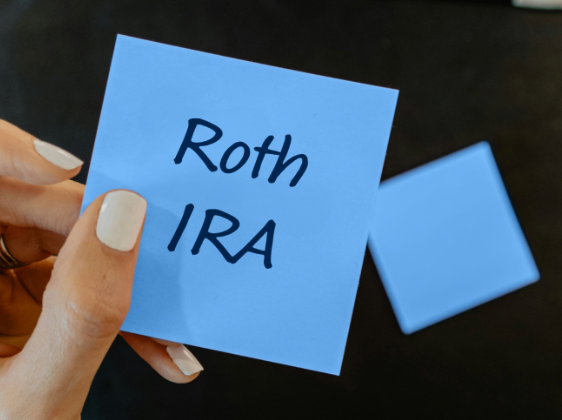IRA vs. CD: Which savings option is right for you?
Explore the difference between an IRA and a CD, benefits, and drawbacks to help you make informed decisions about your retirement and savings strategy.
Home > Retirement > IRA vs. CD
IRAs offer tax advantages and long-term growth: Traditional and Roth IRAs provide tax benefits and access to a broad range of investments, ideal for long-term retirement savings.
CDs provide fixed returns with low risk: CDs are time-based savings products with guaranteed interest, best suited for short- to mid-term goals and conservative savers.
You don’t have to choose just one: A Roth IRA CD allows you to combine the benefits of both — tax-free growth and fixed returns — offering a balanced, lower-risk retirement strategy.

What is an IRA?
An individual retirement account, also known as an IRA, is a long-term, tax-advantaged investment account that allows individuals to save and invest money for retirement. It is not an investment itself, but rather a container that holds your investments — such as stocks, bonds, mutual funds, and much more.
There are many different types of IRAs, but the most common types are:
Traditional IRA: A tax-advantaged personal savings plan where contributions may be tax-deductible, but withdrawals in retirement are taxed.
Roth IRA: A tax-advantaged personal savings plan where contributions are made with after-tax dollars, but qualified withdrawals are tax-free.
Other types of IRAs include SEP and SIMPLE IRAs for self-employed individuals and small businesses, payroll deduction IRAs, and SARSEP. For the purpose of this article, we will be focusing on traditional and Roth IRAs.
If you’re looking for more in-depth information on Roth IRAs — or want a deeper comparison between Roth IRAs vs. traditional IRAs — be sure to check out the respective links on these topics.
Pros of an IRA and Roth IRA
IRA accounts benefit from unique tax breaks from the government, incentivizing saving for retirement and maximizing growth of your retirement funds. Let’s consider some pros of traditional and Roth IRAs.
Tax benefits
One of the main differences between traditional and Roth IRAs — with Roth IRAs also offering unique benefits — is the way they are taxed.
Traditional IRAs offer upfront tax deductions, but distributions are still taxed. Roth IRAs do not provide upfront tax deductions but grow tax-free, with tax-free withdrawals in retirement.
These tax benefits can also help you get tax breaks in the current fiscal year, or maximize your retirement savings later on.
If you are comparing an IRA vs. certificate of deposit (CD), tax benefits may be an important factor to consider.
Flexible investment options
Both traditional and Roth IRAs offer a wide range of investments to invest your IRA funds, including: stocks, bonds, mutual funds, exchange-traded funds (ETFs), CDs, and more. This allows for flexible investment opportunities, which could potentially diversify your IRA investment portfolio.
Choosing a diverse range of savings and investment options for your IRA can help maximize your retirement savings, but it is also important to be aware of the potential risk of losses when it comes to investing. It may also be wise to look into where to invest for good returns when choosing your IRA investments.
Long-term retirement savings options
If you don't have access to a 401(k), or other employer-sponsored retirement plan, a traditional or Roth IRA can be an option to consider for long-term retirement savings.
Furthermore, penalties and taxes on early withdrawals can even work to prevent you from making early withdrawals and tapping into your retirement funds.
When comparing IRAs vs. CDs, both can be used as retirement savings options, even though one is longer-term than the other.
Cons of an IRA and Roth IRA
Although the government offers tax benefits to incentivize contributing to an IRA, there are also some tradeoffs that you may encounter, such as withdrawal penalties and contribution limits. Let’s consider some cons of IRAs.
Contribution limits
Both traditional and Roth IRAs have contribution limits, which happen to be the same for both accounts.
The limit for 2025 is $7,000 if you are under 50, or $8,000 if you are 50+.1
This limit applies across all IRAs, rather than per account, if you have more than one IRA.
Income limits
Traditional IRAs do not have income caps, but in order to make contributions to a Roth IRA, you need to fall below the IRS income limit.
The 2025 income limit for full contributions to a Roth IRA is a modified adjusted gross income (MAGI) below $150,000 for single filers, or below $236,000 for married couples filing jointly.² Contribution limits will be reduced if your income is above this limit, until you are no longer able to contribute.
For a complete list of income thresholds, please see our Roth IRA page.
Withdrawal penalties
IRAs have the option for early withdrawals if needed, but penalties may apply depending on the type of IRA.
Traditional IRAs charge a 10% penalty on top of the taxed amount if you make a withdrawal before age 59½. Note that taxes also have to be paid on traditional IRA distributions made in retirement.
Roth IRAs allow tax-free and penalty-free withdrawals on contributions at any time, but withdrawals on earnings before age 59½, or before owning the account for five years, will also result in a 10% penalty fee.
Qualified exceptions can waive this fee for both accounts.
Varied returns
Unlike CDs, which have fixed returns, returns on IRA contributions may vary depending on the types of investments you make, market and interest rate fluctuations, and other factors.
It is important to be aware of potential risks of losses when choosing your IRA investments. This could be something else to keep in mind when comparing IRAs vs. CDs.
What is a CD?
Certificates of deposit, also known as CDs, are a type of deposit account offered by banks and credit unions. A CD is a time deposit, meaning you agree to leaving your money untouched in your account for a specified period of time — also known as a fixed-term CD. In return, you earn interest on a predetermined, fixed interest rate, which tends to be higher than many other banking deposit products.
Unlike savings accounts, CDs operate by leaving your deposited funds untouched in your account for a fixed period of time. Fixed terms may last from as little as one month up to five years (60 months). However, your money would be accumulating interest based on a predetermined interest rate during the entire duration of your fixed period.
Once the term is up, the CD will have reached maturity, and you can withdraw your original balance and any interest earnings, or you can also choose to roll over some or all of those proceeds to start a new CD with a new term.
If you withdraw your money before a fixed-term CD reaches maturity, you may be charged a penalty for early withdrawal. On the other hand, no-penalty CDs do not have early withdrawal fees, but in return may have lower interest rates than fixed-term CDs. Another option to consider, if you want to avoid withdrawal fees, may include savings accounts or other high-yield savings options.
The Raisin marketplace allows you to compare and access a wide selection of CDs with competitive interest rates and flexible features. With a simple one-time registration, you can browse through high-earning CDs and other products, all in one portfolio.
Pros of CDs
CDs can be a great way to put your money to work if you know you won’t be needing regular access to it for a set period of time. Here are a few pros of CDs when comparing IRAs vs. CDs.
High interest rates and guaranteed returns
CDs pay comparatively high interest rates compared to normal savings accounts. Since CDs have fixed annual percentage yields (APYs), you will lock in the agreed-upon interest rate for the entire duration of your term. This can be especially beneficial during volatile economic periods where inflation and interest rates are constantly fluctuating.
Therefore, if you leave your money untouched until your CD matures, you will have guaranteed returns on your initial deposit. This may also be a more appealing alternative to those with lower risk tolerance. Because of the lower risk tolerance, you may even consider using a CD to help grow your retirement savings.
Widely available
CDs are open to almost anyone, and are widely available at banks and credit unions.
The Raisin marketplace allows you to compare different banks and credit unions in one portfolio, so you can choose what best fits your needs.
Shorter time horizon than IRAs
CDs generally have shorter time horizons than IRAs. If you have CDs that mature before you reach retirement age, then you do not have to wait until a certain age to access your funds, unlike with traditional IRAs.
This can also be useful for reaching goals, like saving for a car or another big down payment, if you don’t immediately need to access your money, but also don’t want to wait until retirement to be able to do so.
If you are debating between a Roth IRA or CD, it may be wise to consider the time horizon of what you are saving for.
Cons of CDs
While CDs may have various perks to offer, it is also important to note any potential drawbacks you can face if you are looking into adding one to your retirement planning.
Here are some cons of CDs you may want to consider.
Early withdrawal fees
Like traditional IRAs, and sometimes Roth IRAs, you may face penalties when withdrawing money too early.
If you have a fixed-term CD and wish to withdraw before it reaches maturity, you may have to forfeit your interest rate and pay extra fees.
No tax benefits
Another difference between an IRA and a CD is that CDs do not benefit from tax advantages. Interest earned from a CD is also subject to taxes.
Regardless if you receive interest in cash or decide to reinvest it, the amount of interest earned is considered taxable income by the IRS. If a CD has a term longer than one year, interest must also be reported annually, even if the CD cannot be cashed out until maturity.
If you do have to pay an early withdrawal penalty, then you can deduct this from your taxes and potentially reduce the amount of taxes you owe on the CD interest.
Lower returns than other investment options
Although CDs offer some of the most competitive interest rates amongst savings products, you may not get the same returns compared to investing in stocks, bonds, mutual funds, or other investments.
However, you won't be facing the same risk of loss on your initial investment since you would lock in a fixed interest rate. Therefore, while earnings may be lower, they are at least guaranteed.
Other investment options may have the potential for higher returns, but you would still face the risk of losses, which might not sound appealing to some people.
If you are debating between a CD vs. Roth IRA, it may be important to consider your risk tolerance as well, as it can help determine what type of investment may be best for you.
High deposit requirements
Some banks and credit unions may have high initial deposit requirements for CDs, or even fees if you go below the minimum.
However, this is not the case at Raisin. The Raisin marketplace offers CDs that do not require minimum deposit amounts. This can be very appealing to someone who may not have $10,000 to $100,000 to deposit upfront.
What is a Roth IRA CD?
We’ve covered the difference between Roth IRA and CD — but what if you were to combine the two?
If you would like to benefit from an IRA and a CD, or simply want to diversify your retirement savings portfolio, you may also want to consider a Roth IRA CD.
A Roth IRA CD combines two financial tools — a Roth IRA and a CD — by holding a CD inside a Roth IRA. Instead of investing all of your Roth IRA funds in stocks, mutual funds, ETFs, etc., you could also choose to put some (or all) into a CD. Some banks even offer specific IRA CDs.
If you put a CD inside a Roth IRA, your CD would still earn interest at a fixed rate, but you won’t have to pay taxes on the interest you earned due to the tax rules of a Roth IRA. You could also get tax benefits, such as tax-free withdrawals in retirement, if you open a CD in a Roth IRA. This may also be an option to consider if you are nearing retirement and want conservative growth.
You can even use CD laddering — dividing a sum of money into equal parts and investing them in individual CDs with different maturity dates — to lock in interest rates and get the most of Roth IRA CD benefits.
What is better, a Roth IRA or a CD?
It is possible to have different IRAs and CDs during the course of your life. One option is not necessarily “better” than the other — in fact, many people find themselves wondering, “Is a CD better than a Roth IRA?” The answer depends on your financial goals, timeline, and risk tolerance. To decide where you want to allocate your funds, you may want to consider the pros and cons of both products, along with key differences we’ve covered.
IRA vs. CD: Difference between an IRA and a CD
Here is an overview of the key differences, which can help you decide what product is right for you:
Feature | IRA (Traditional or Roth) | CD |
Purpose | Retirement savings account | Short- to medium-term savings |
Tax benefits | Yes: Traditional IRA = Tax deferred; Roth IRA = tax-free growth and withdrawals | No tax benefits unless in an IRA |
Growth potential | High (Invested in stocks, bonds, etc.) | Low to moderate (Fixed interest rates) |
Risk level | Varies (Can be high with market-based investments, returns on high-risk investments not guaranteed) | Very low (Guaranteed returns based on fixed interest rates) |
Withdrawal flexibility | Restricted before age 59½ (penalties may apply), withdrawals on contributions in Roth IRAs allowed at any time | Early withdrawal penalty if taken before maturity (Does not apply to no-penalty CDs) |
Time horizon | Long-term (Retirement focused) | Short- to mid-term (three months – five years) |
How Raisin can help grow your retirement funds
Are you ready to grow your retirement savings or make the most of your hard-earned money? Raisin makes it easy to maximize your savings with just one account. Access a network of trusted banks offering competitive interest rates on CDs and other high-yield savings products — all in one place. Compare rates, choose the best fit for your financial goals, and start saving smarter today.
The above article is intended to provide generalized financial information designed to educate a broad segment of the public; it does not give personalized tax, investment, legal, or other business and professional advice. Before taking any action, you should always seek the assistance of a professional who knows your particular situation for advice on taxes, your investments, the law, or any other business and professional matters that affect you and/or your business.


